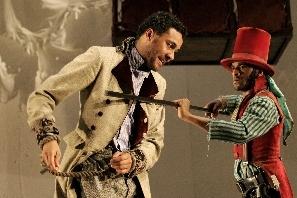Comedy Of Errors - RSC 2006
One of Shakespeare's earlier plays (possibly even his first play, and probably written in the early 1590s), 'The Comedy of Errors' focuses on what were to become some of the bard's favourite subjects - twins, mistaken identity and a shipwreck. The latter leading to not one, but two sets of identical twins being separated, setting-up the mistaken identity years later when the twins coincidentally find themselves in the same setting. Maybe it is far fetched as a concept, but it certainly gave Shakespeare the opportunity to 'go overboard' in developing the humour in the piece. And in the hands of Director Nancy Meckler and this very fine RSC cast, Shakespeare's sense of fun is brought out to the full, in what is a magically enjoyable and excellent all-round production.
Katrina Lindsay's set could almost be a ship. In fact it's meant to be dry land, but with tattered sails hanging from the flies, planking covering the stage, and a gigantic wooden pillar rising up towards the heavens like an enormous mast, the set is full of sea-faring symbolism, providing a background filled with the attendant threat of peril and total destruction through storm and shipwreck.
When the play opens, Egeon a merchant, has arrived in Ephesus searching for one of his twin sons who was separated from Egeon and the rest of his family during a shipwreck. Born some 30 years earlier, the twins were (rather confusingly) given the same name, Antipholus, and later, each was given one of another set of identical twins as a servant. To add to the confusion, each of the servant twins also had the same name, Dromio.
As a stranger in the hostile land of Ephesus, Egeon immediately falls under sentence of death unless he can find someone to bail him out, or he can find his son. Though Egeon's predicament hangs over the entire play (reflected in the threatening setting), the humour soon takes over as Shakespeare switches focus to Egeon's twin sons. One is married and has been living in Ephesus all along, and the other has just arrived in the country. And soon, each of the twins and their respective servants are being mistaken for each other. Each of the Antipholuses gives instructions to the wrong Dromio, and then find their instructions have not been carried out. Antipholus of Ephesus finds he's been dispossessed of his house and wife, while Antipholus of Syracuse, as if in a dream, finds a wife he never knew he had, and unknown people giving him material gifts, such as gold chains.
The casting of the twins (in terms of the similarity of their physical appearance) is highly effective - particularly so in the case of the Dromios, who sometimes force us to do a double-take, and think about which of them is on stage.
Both Christopher Colquhoun (as Antipholus of Ephesus) and Joe Dixon (Antipholus of Syracuse) turn-in excellent, though distinguishable, performances. And Forbes Masson (Dromio of Ephesus) and Jonathan Slinger (Dromio of Syracuse) provided exceptionally fine comic performances - though for me, Slinger's performance was a nose in front with a near-perfect study in comic acting, defined by glorious gestures and superb timing. Throwing herself onto the stage in a fit of histrionics, or desperately trying (and failing miserably) to rip a handkerchief in two in rage, Suzanne Burden also excelled as Adriana, the shrew-like wife of Antipholus of Ehesus.
Meckler wraps the play in a magical, dreamlike framework that seems to heighten the humour, but also lends a mysterious if not an eerie feel to the whole piece. If I'm not mistaken, she's drawn on other forms of entertainment in formulating her concept. For example, when Antipholus of Ephesus is locked-out of his house, he uses his Dromio as a human battering ram, reminiscent of the scene in Fawlty towers where Basil picks up Manuel and holds him horizontally to a window. And the red hats and costumes of the Duke's officers/ policemen (who menacingly wield cut-throat razors) reminded me of scenes from Martin Scorsese's film 'Gangs Of New York'. Still, it's a well-orchestrated production that quite brilliantly milks (in the nicest possible sense), Shakespeare's work for every ounce of humour, resulting in an immensely enjoyable evening of theatre.
(Peter Brown)
Production photo by Ellie Kurttz
Originally published on
